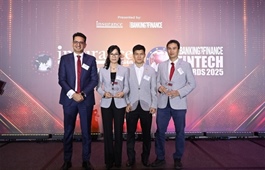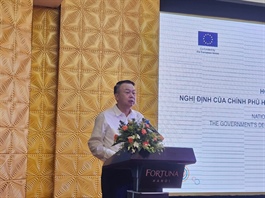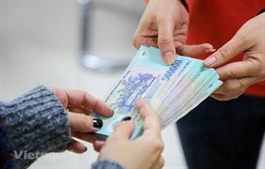Fintech sandbox era underway in Vietnam
Fintech sandbox era underway in Vietnam
Businesses are expected to venture further into tech-led business models in Vietnam in anticipation of new incentives from major policies.
On June 27, Mobifone, Techcombank, and One Mount Group jointly contributed to establish a payment company with a capital of VND300 billion ($12 million), using the Mobifone brand name.
Its main business lines include payment intermediary services such as financial switching services; international financial switching; electronic clearing; electronic payment gateway; and collection and payment support.
The joint venture was established just a few days before Decree No.94/2025/ND-CP on the controlled pilot mechanism in the banking sector took effect from July 1. The decree allows three controlled pilots of fintech models: peer-to-peer (P2P) lending, credit scoring, and data sharing via open APIs.
Pham Tien Dung, Deputy Governor of State Bank of Vietnam, said, “During the implementation, we will continue to review and update new products, services and business models in the banking sector to evaluate and propose expanding solutions eligible to participate in the testing mechanism.”
Shopee and Lazada are also expected to apply for a licence for the P2P lending pilot over a two-year period.
Technology expert Tien Hoang said that Decree 94 is considered as one of the key tasks in the implementation of the recently issued strategic resolutions on sci-tech, international integration, legal reform, and private economic development. With this enforcement, the banking sector will attract more players.
“More foreign-invested enterprises are making investment in new business models in Vietnam. Besides the banking sector, they are interested in areas such as low-orbit satellite technology, AI, and others,” he added.
In the latest development, American space tech company SpaceX, the owner of the Starlink system, is completing procedures to establish a foreign-invested business in Vietnam.
“After completing the business registration, SpaceX can apply for a licence to provide low-orbit satellite services,” Nguyen Anh Cuong, deputy general director of the Vietnam Telecommunications Authority said. “SpaceX will be allowed to test satellite technology in Vietnam within a five-year pilot phase, ending no later than January 2031.”
He added that SpaceX could also establish a fully foreign-owned enterprise in Vietnam thanks to newly introduced legislation on the matter. It allows for a controlled pilot of telecommunications services using low-orbit satellite tech, while not limiting the ownership ratio of foreign investors, deemed an important step in attracting global technology corporations.
In late 2024, SpaceX announced its plan to offer Starlink satellite Internet telecommunications services with a planned investment of $1.5 billion in Vietnam. In April 2025, during his visit to the United States, Deputy Prime Minister Ho Duc Phoc presented the pilot decision to this group.
Following this trend, on June 10, Qualcomm opened a new AI research and development centre in Vietnam. It is set to play a key role in developing cutting-edge generative AI and agentic AI solutions, with applications spanning smartphones, personal computers, extended reality, automotive technology, and more.
Thieu Phuong Nam, country director of Qualcomm Vietnam, Cambodia and Laos, said, “Qualcomm’s activities in Vietnam align with the country’s national strategies on AI, semiconductors, and digital transformation, with a focus on technology transfer, ecosystem development, and capacity building.”
Vietnam aims to rank among the top three countries in Southeast Asia for AI research and development by 2030. Towards such ambition.
Following rules set in February, donations from enterprises for scientific research, tech development, and innovative activities, and expenses allocated for such areas within enterprises are deductible when determining the income subject to corporate income tax. Incomes from salaries and remuneration from carrying out state budget-funded sci-tech tasks are exempt from personal income tax.
Meanwhile, the Ministry of Science and Technology launched a science and technology exchange on June 30, with the aim to boost technology transactions, and improve productivity and efficiency.
Moreover, several new laws on science and technology are paving the way for the market to grow. In late June, the National Assembly passed the Law on Digital Technology Industry, becoming the first country in the world to promulgate a separate law on the industry; the Law on Science, Technology and Innovation; and the amended Law on Technical Standards and Regulations.
The Law on Digital Technology Industry, which took effect from July 1, marks the first time the concepts of digital assets and crypto are legally recognised in Vietnam, complete with detailed provisions on the rights and obligations of related parties and business conditions.
Also for the first time, the semiconductor industry is now positioned and legalised in the legal system. This is the basis for promoting the development of the semiconductor industry, an important industry that plays a role and impacts many sectors in today’s digital age.
Technology expert Le Net noted, “The regulations will enable Tether, a blockchain-enabled platform that facilitates the use of fiat currencies digitally, and Exness Investment Bank, as well as Intel, Samsung, and others, to make new steps in the country. They have been waiting for this moment for a long time.”

Fintech sandbox era underway in Vietnam, illustration photo/ Source: freepik.com |
Nguyen Khac Lich, director Department of IT Industry Ministry of Science and Technology
The Law on Digital Technology Industry marks a strategic step forward, gradually turning Vietnam into a global digital tech centre. To make it a key economic driver, the law provides outstanding incentives for key projects in digital tech, semiconductors, AI, and data centres.
For example, projects with capital of $240 million or more enjoy a tax rate of 5 per cent for 37 years, tax exemption for six years, 50 per cent tax reduction for the next 13 years, and land rent exemption for up to 22 years and 75 per cent reduction for the remaining years.
Enterprises also receive financial support from the budget and the Development Investment Fund. Concentrated digital technology zones and innovative startup projects enjoy similar incentives to those in extremely disadvantaged areas, creating a strong driving force for digital tech enterprises.
Foreign-invested enterprises are encouraged to transfer technology, cooperate with such enterprises here to improve production capacity and global competitiveness.
The law focuses on developing personnel with policies to support training, provide scholarships, preferential credit for learners, and build online teaching platforms. High-quality human resources in the industry are exempted from personal income tax for five years, granted five-year visas for foreign experts, along with a competitive salary and bonus mechanism.
The law also aims to build a strong business ecosystem, with the goal of having 150,000 such businesses by 2035. The ecosystem is built with cooperation among large, small, and supporting enterprises. Digital infrastructure such as AI data centres and 5G networks are prioritised for investment, with the participation of both the state and private enterprises.
Notably, under the law, the semiconductor industry is legalised with a strategy to develop specialised chips, linking the global supply chain; while creating the first legal framework for AI, and shaping the legal status of digital assets and related management.
- 11:05 10/07/2025




























